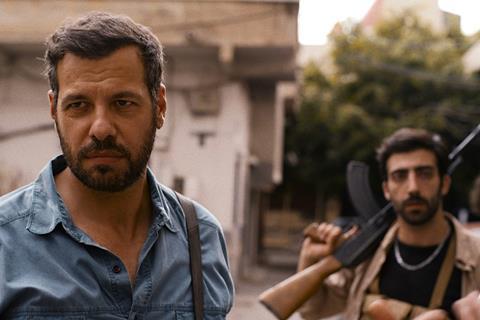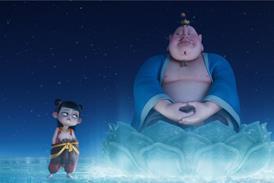Laurent Lafitte stars in this period literary drama set against the backdrop of the Lebanon conflict

Dir. David Oelhoffen. France/Luxembourg/Belgium 2024. 116mins
French drama The Fourth Wall muses on the relationship between theatre and political reality, but the titular partition largely remains intact in a drama firmly grounded in modern history. Set in Lebanon in the early 80s, and following a theatre group’s staging of Antigone during the build-up to one of the most notorious events in Middle Eastern conflict, this highly literary film is an intellectually ambitious but sometimes ponderous offering from French writer-director David Oelhoffen, best known for 2014’s Far From Men.
Intellectually ambitious but sometimes ponderous
Contemporary resonance, given the recent intensification of events in Lebanon, plus an approachable if sometimes glum lead from popular French regular Laurent Lafitte (recently seen in hit costumer The Count Of Monte Cristo) should give the film appeal to serious-minded audiences on the festival circuit. Le Pacte will release in France in January 2025.
Based on the 2013 French novel by Sorj Chalandon, the film – shot in Lebanon and Luxembourg – begins in Lebanon in 1983, when French actor Georges (Lafitte) finds himself under fire. The action then jumps back a year to France, where Georges agrees to travel to Beirut to take over a production of Jean Anouilh’s play Antigone for his seriously ill director friend Sam (Bernard Bloch). Aided by driver Marwan, from Beirut’s Druze community (Armenian-French dependable Simon Abkarian), Georges meets Sam’s cast, comprising several of Beirut’s co-existing and conflicting communities. Among them are Marwan’s son Nakad (Tarek Yaacoub), a young Catholic woman (Tracy Younes), and Palestinian Imane (Manal Issa), who plays the classical rebel heroine Antigone – and for whom Georges falls hard.
In order to continue the production, due to be staged close to Beirut’s Green Line of demarcation, Georges must negotiate with wary political leaders and relatives of cast members, including Shi’ite Muslims and, one actor’s brother, a Christian Phalangist militant. Georges keeps his cast motivated, explaining the nature of Anouilh’s reworking of classical tragedy – which, first performed in 1944, was a parable for French resistance to occupation, which clearly has resonances for Lebanon. Above all, Georges points out that the essence of classical tragedy lies in the characters’ destiny being irrevocably predetermined – which will clearly be the case in this film.
Oelfhoffen doesn’t over-stress the formal play between the cinematic and the theatrical – Georges watches his actors on video, and one rehearsal is partly shot from the front, as if on a stage, but otherwise the self-reflexivity is in the drama and the sometimes solemnly discursive dialogue. Photographed by Guillaume Deffontaines, the film evokes an intense, starkly unromanticised sense of what everyday Beirut might have been like at this period. A large cast brings sharply defined characterisations to very diverse roles – Abkarian contributing his usual stalwart gravitas, and Manal Issa (Danielle Arbid’s Parisienne, Sally El-Hoseini’s The Swimmers) radiating an ebullient, defiant energy that fits both Antigone and Imane.
Less convincing is Lafitte, usually adept at combining affability and emotional weight in roles serious and comic, but a little earnestly lugubrious here, as if weighted down by the burden of moral and historical responsibility. Admittedly, he is challenged by a drama that jumps from the contemplatively downbeat to the horror of real-life atrocity – and that stretches plausibility when Georges is called on to become a participant, not just an observer, in a direct and very brutal settling of scores. While Oelhoffen’s intentions are never other than eminently sober and intellectually searching, it’s this dramatic turn in particular that makes it hard not to see this French protagonist’s adventure as somewhat partaking of conflict tourism.
Production companies: Eliph Productions, Rhamsa Productions, Move Movie
International sales: Le Pacte contact@le-pacte.com
Producers: Christine Rouxel, Maya Hariri, Bruno Lévy, Bady Minck, Alexander Dumreicher-Ivanceanu, André Logie, Gaétan David
Screenplay: David Oelhoffen, based on the novel by Sorj Chalandon
Cinematography: Guillaume Deffontaines
Production design: Hussein Baydoun, Christina Schaffer
Editing: Sandie Bompar
Music: Tom Gatti, Jérôme Reuter
Main cast: Laurent Lafitte, Simon Abkarian, Manal Issa, Bernard Bloch
























